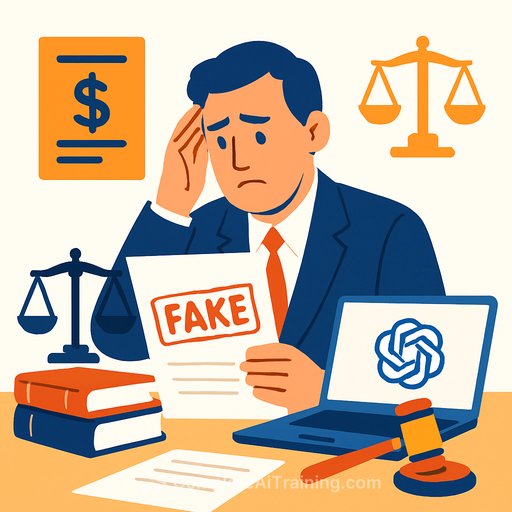California appeals court fines lawyer $10,000 for AI-fabricated quotes - a wake-up call for the bar
A California appellate panel fined Los Angeles attorney Amir Mostafavi $10,000 after finding that 21 of 23 quotations in his opening brief were fabricated by ChatGPT. The court said it plainly: "We therefore publish this opinion as a warning… no brief, pleading, motion, or any other paper filed in any court should contain any citations… that the attorney responsible for submitting the pleading has not personally read and verified."
The sanction, issued by the 2nd District Court of Appeal, is among the largest state-court penalties tied to AI use. The panel also found the appeal frivolous, citing violations of court rules and wasted judicial resources.
What happened
Mostafavi told the court he used ChatGPT to "improve" his draft and did not read all of what the model produced before filing. He said he did not expect the system to invent citations or quotations. His takeaway was blunt: "We're going to have some wreckages."
The bench noted that courts across the country are encountering filings that include fake legal authority. This is no longer rare. It's routine enough that opinions like this are being used to deter the next incident.
The policy shift underway
California's Judicial Council has directed courts to either ban generative AI or adopt a policy by December 15. The State Bar is evaluating whether to strengthen ethical guidance for AI use, building on duties of competence and candor. Expect more local standing orders and mandatory trainings.
- Competence includes technology. See ABA Model Rule 1.1. Read Rule 1.1
- Sanctions on appeal are authorized under California Rules of Court. Rule 8.276
Why this matters to your practice
- Courts are actively scrutinizing AI-tainted filings. Sanctions, referrals, and reputational damage are on the table.
- LLMs confidently state falsehoods, especially when asked to prop up weak arguments. The harder the ask, the more confident the error.
- Trackers report dozens of incidents in California and hundreds nationwide. Frequency is climbing.
- It's not just lawyers. Recent reports show judges have inadvertently cited nonexistent authority too.
The compliance baseline
- Read every source you cite. No exceptions.
- Verify all citations with primary sources and a citator (e.g., Shepardize/KeyCite). Quotes and pincites included.
- If the opinion text you're quoting can't be found in the official or reputable reporter, cut it.
- Maintain an audit trail: prompts, outputs, and the materials you actually reviewed.
- Disclose AI assistance only where required by rule, order, or client agreement. Never rely on AI as an authority engine.
Practical workflow: safe ways to use AI
- Use AI for outlines, style edits, and issue spotting. Do not use it to generate case law or quotations.
- In prompts, forbid the model from creating citations and ask for a research plan instead. Then run the plan yourself.
- Validate quotes: pull the opinion PDF, search the exact string, confirm context and holding. Don't trust summaries.
- Institute a second-review protocol. A colleague who did not run the prompts should check every cite and quote.
- Create a firm policy covering approved tools, prohibited tasks, verification steps, and client/tribunal disclosures.
Team training that actually prevents sanctions
Most incidents come from a basic gap: lawyers think "AI knows," when it guesses. Close the gap with simple habits and shared checklists.
- Teach why hallucinations happen and how to spot them.
- Adopt a one-page pre-filing checklist focused on citations, quotes, and sources.
- Run tabletop drills: assign a tough prompt, have associates surface errors, and correct them.
- If your team needs structure, consider focused courses on safe AI use for legal work. Explore role-based AI training
Bottom line
AI can speed parts of your process, but it cannot carry your professional duties. If you didn't personally read the authority, you own the risk.
Treat the appellate court's warning as policy in your practice: no citation goes in unless you have verified it yourself, line by line.
Your membership also unlocks:






